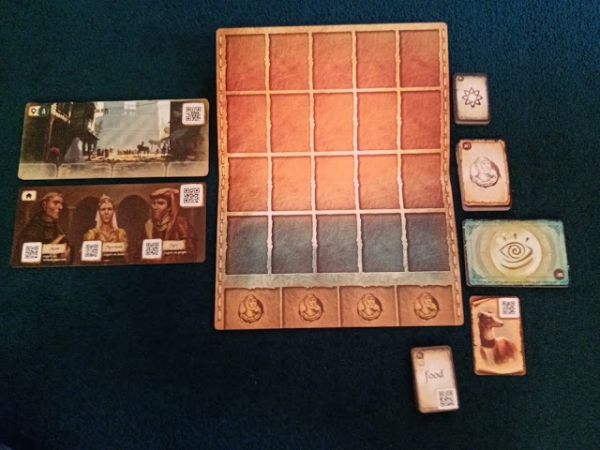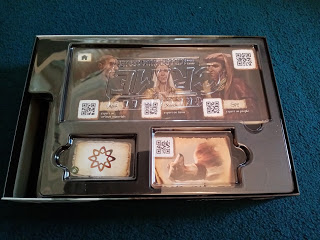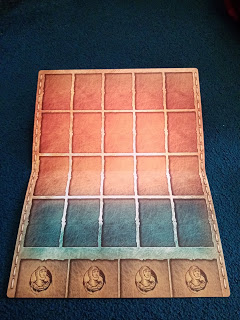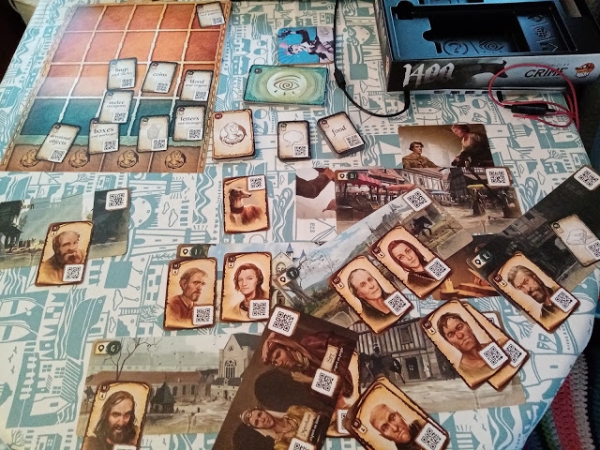It’s an exaggeration to say that digital content and apps are controversial in boardgames, but it is fair to say that they’re crowd splitters. Between fears of not being able to play a game when digital support is removed and having to hand over part of your device to a company, however trusted, there is some degree of resistance from even those willing to accept the concept.
It’s an exaggeration to say that digital content and apps are controversial in boardgames, but it is fair to say that they’re crowd splitters. Between fears of not being able to play a game when digital support is removed and having to hand over part of your device to a company, however trusted, there is some degree of resistance from even those willing to accept the concept. Added to that the fact that many app integrations boil down to glorified timers and a lot of gamers only play games to get devices off the table, games with integrated apps will have some people giving a game the side eye. The Chronicles of Crime series has arguably been the counter to that position, being one of the premiere app-based tabletop integrations. The latest installment of the series places players in the 1400s as a vision experiencing semi mystical investigator in a fairly non-specific medieval world, so how well does using a piece of 21st century technology to look into a 15th century world work?

Gameplay in Chronicles of Crime is reasonably intuitive, and what mechanics there are players are guided through by the well written and clear tutorial in the app. Play consists of scanning QR codes on cards to gain information, either by looking at an item or interviewing a suspect when they can be asked about an item or individual in turn. Scenes can be checked directly through looking at an image of a location and picking out interesting objects. Each additional scan takes game time, when players think they have solved the mystery they can offer to present their solution to the app, which will ask a series of questions. Answer them correctly, having taken as little time as possible, and while managing to pick up certain objects along the way, for the best possible score.
The first weird quibble I have is with that learning tutorial scenario. I understand why it’s there, to hand hold through learning the game so that someone doesn’t have to do the donkey work of grinding through the rulebook before presenting the game to the team. It’s there to make learning fun and social. The issue I have is that splendid though it is, it’s clearly a watered-down version of the main game with a simple puzzle that still takes half an hour to get through. The rulebook still needs to be read and referred to occasionally so it feels a little like a wasted play session slowly going through a fairly simple scanning flow system which was clear from the rulebook.
The physical game itself is clearly a high-end product, with lots of custom art, stacks of cards and a thick highly useful plastic inlay. Which is why a couple of weird choices stick out, first is a player board made of thin card which due to being folded up in the box resolutely refuses to sit flat on the tabletop without being weighted down, which is made worse since its one job is to act as a mat for cards that inevitably skid around when one end of the board pops up. The other is the secondary clear plastic overlay inlay which is the first I’ve come across in my memory of gaming. Essentially, it’s a large piece of clear plastic that sits over the components in the box, presumably to keep the cards from skipping from their intended slots during unusually violent transporting. The thing is, the main inlay is well designed so that I don’t think this is a huge concern. Added to that, the cards are (apart from two types) all different sizes, so re-ordering if there is mixing is extremely simple, and since all the cards are not only free of information but actually multi use due to the all information on them being contained in the QR codes there’s no confusion or missed surprises from seeing their faces ahead of time. As such in a period where many companies are working harder and harder to cut down superfluous plastic in their games this fairly substantial piece of plastic to no real purpose seems a bizarre decision.


With those minor quibbles aside, how well does it play, particularly as an integrated app game? Well, that possibly depends on how well you’ve integrated with your smartphone and your feeling about QR codes. Chronicles of Crime have never made any secret of their taking their influence from Sherlock Holmes Consulting Detective, a game I personally love to such an extent that we took it on our honeymoon with us. There’s something inherently right in Consulting Detective with it being based on paper, flicking through indexes, checking maps, reading passages and often making scribbled notes (ideally on shirt cuffs) because that is the world of Sherlock Holmes. Equally in the original, contemporarily set Chronicles of Crime, lining up suspects on a pinboard and using a phone to examining them seemed totally appropriate to a modern police procedural world. However, wandering around a non-specific medieval world as a vision experiencing mystic of non-specified skills or position waving your smartphone at every peasant and tenement doesn’t click in quite the same way. There are people that view much of their day-to-day life through their devices, and for those people it’s possible that this step feels as natural as looking at a game through a set of spectacles would for a lifetime wearer of glasses, hence my point that your feeling about the smartphone’s integration into this world will probably say something about its integration into your own, but personally, it sat a little weirdly at various points.
Generally, the new theme for the series seems a little peculiar. Previously the series has hit the modern police procedural, which makes total sense, the noir detective thriller, which is another detective classic area. It moved on to 80s flashback kids in mysteries, which while less classic is at least heavily fashionable. Investigating the 1400s then seems a little bit odd. It’s not totally unprecedented, but it is odd. Particularly since a large part of the justification for the app integration in the Chronicles of Crime series is that it allows essentially infinite content to be presented for the same set of physical components. When the creator then presents four sets of physical components with two more in the works that justification starts to look more and more flimsy.
So, how effective is the app integration? Again, that’s probably a matter of personal choice. I know that some people see a page of text in Sherlock Holmes Consulting Detective and their eyes roll, on the other hand I know some people who approach that with gusto since it means they get a good long run of reading during which they’ll get to do all the voices and everything. If you’re one of the first sorts of people then the Chronicles of Crime app version of this style of game is built for you as passages of information come in one or two sentence pieces, if you’re one of the second type then the app has probably stolen one of your favourite parts of the game. It is possible that the app could support actor’s voices, which would make this series a much more accessible game for those with vision and learning difficulties.
Ultimately the primary mechanic of the app is one of scanning QR codes, which means that a solid third of the game is spent hovering a phone slightly up and down over a QR code. It might be a personal thing, but I can look up a passage in a book more quickly than I can scan a QR code, and with far less frustration when I happen to have flipped to the wrong page than when I move a camera back and forth by millimeter increments muttering about why it won’t work. I’ll talk about the game being better played solo in a little bit, but for the record, the single biggest reason that its best played solo is because that way you don’t have three other people asking if you want them to do it after four seconds of the phone failing to instantly focus.
Another issue with the app is the sheer grind of scanning in and out of interviews. At times players will go to a location, scanning a code, see someone they want to talk to, scanning a code, and ask them about an object, scanning a code, to be told they don’t know anything about it. Fair enough, on to the next witness, who states that the previous person does know about the object, so you need to go back and ask them about the object with this new information, which means backing out and scanning, and scanning again. It might not sound major, but when you’ve scanned your 20th QR code in 40 minutes it starts to grate on the nerves. When the first witness doesn’t react to the new information anyway, it makes that little vein in the corner of your forehead begin to stick out. A lot of the time the upshot is to end up asking everyone about everything just to save the rigmarole of backing out and scanning back up later, which considering that’s the basis of the game’s score is a little of an issue.
The biggest benefit of the app mechanically then is that it allows items to be cross referenced and compared in a physically elegant fashion without needing to be done in a mechanically elegant one. To explain that a little, to compare to Sherlock Holmes Consulting Detective there would often be passages where players might interview a given witness or suspect because they thought they would offer information about a given item or location, only to have them ramble on about something entirely different. In Chronicles of Crime you can show a certain witness a certain item and get their specific response on exactly that object, offering more specific and multiple routes through the game. To do this physically without the app would require a book length table of mind destroying tiresomeness. In theory the upshot should be far fewer frustrating dead-ends during play. In practice those dead-ends still crop up with irritating regularity.
While not multiplayer solitaire, there is sometimes a sense of playing a social solitaire with the app version. This comes up most strongly in two places, reading out of the cards and scanning of the scenes. As previously stated, the shorter passages make it harder for players to get their roleplaying/amateur dramatics teeth into the imparting of information, but it also means that there is less of an info dump to discuss when a passage is read out. When reading out a chunky passage with several bits of information, some of which may need noting down, the result is that a team discussion will need to take place at the end. When a shorter scene results in fewer pieces of information its far more natural for the reader to simply explain to the rest of the group what the next step is and that they’re taking it. The result can be that in Chronicles of Crime if the particular scenario is clear to the reader they can end up chaining cards and scans through swathes of what is meant to be gameplay. Worse, if a scene is short enough that they can read it and reach a conclusion more quickly than they can read it aloud the impetus can be to skip the whole reading aloud section and just make the choice, sometimes generally summarizing for the listening audience, and when they don’t the reading aloud can feel like a bit of a box ticking job rather than a social experience. The only “mandatory” player interaction is when looking at a scene within the app. The rules suggest that one player scans and calls out what they see while other players search the deck of objects. The issue is that it’s often more effective and efficient for the scanner to look and then go through the object deck, pulling out anything that they saw since the object cards act as possible clues, meaning that the one piece of theoretical interaction can feel like something of a disadvantage. This also only really works as social interaction with 2 players, if you play with 4 people what the other 2 are meant to do beats me. Which brings me to the player count generally which is 1-4; why does it stop at 4? Nothing about the game suggests that it is better or worse at accommodating 4 players than 5, or 6, or frankly, 100. Generally, the game feels like a pretty good solo game, but it’s really not a multi-player game.
Tracking back to Sherlock Holmes Consulting Detective for a moment, one of the things that I most love about that game is that I can play it sat in an armchair while one friend sits on an overstuffed sofa and a third lounges on a day bed (I don’t have a day bed, but I can dream). For such a free form game Sherlock Holmes is surprisingly compact. One player grabs the map and the directory, one the casebook and one a pad and pen and you can sit at opposite ends of the lounge, sprawled and smoking Turkish tobacco if you so choose. Everyone can have a job and input; everyone can venture opinions on whether the “victim” is actually the criminal in bad drag. Chronicles of Crime doesn’t really manage that, the only thing that will sprawl here is the game layout, and all players that want to interact directly with any of the objects in the game will find themselves tied to whichever table you decide to smother with it. You can only play with one app at a time, so there isn’t even the option for multiple players scanning cards on different devices simultaneously. The most immersive thing about Sherlock Holmes is that I can generally picture Holmes and Watson sat around much as I and my fellow players are sat around playing the game. I’m not sure quite how the protagonist in Chronicles of Crime 1400 and his faithful dog sit around, but I’m betting it’s not hunched over a table covered with cards trying to hold a smartphone still.

In relation to the aforementioned hood wearing vision having protagonist (you have visions at the start of each case represented by cards showing snapshots relevant to the story ahead, these aren’t QR code based so presumably will be re-used if later cases are added to the game app and can give clues as to what to investigate), one of the more minor issues with the game is that their authority is, at best, poorly defined. In the original Chronicles of Crime game players took the part of members of the established police force, it doesn’t seem a stretch to say that if they then prove that someone did it, that person gets arrested. In 1400 instead players are a slightly goth looking outsider who occasionally wraps up a case by accusing major authority figures of involvement in some fairly serious crimes on what is, even by modern standards, pretty circumstantial evidence. The idea that a vision experiencing outsider accusing their betters in the middle ages without ending up on the wrong end of a toasty stake-based encounter after a not unreasonable accusation of witchcraft requires at best some suspension of disbelief. Finally, one of the great things about Sherlock Holmes Consulting Detective is the framing device, in the end, Sherlock knows the answer, he puts you through some hoops for his own amusement, but we all understand that its him who wraps things up at the denouement like the big ol’ drama queen he is. Conversely, in 1400 it’s the high and holy app that takes that part. At the end, there’s a button to click and everything gets explained. Who is doing the explaining? Who knows the answer if not you, the apparently vision powered genius investigator?
All that said, if you’re picking up Chronicles of Crime as a solo experience and you’re happy to sprawl across a six-foot table for an evening, scanning things in your phone and picking through an investigation, it’s a pretty reasonable price for a premium solo experience and works as an interactive murder mystery, which is what it is. If you’re looking to share the experience with someone else, or aren’t sure if you want a game with an app integration, you might want to think twice. Personally, having played through the game, I’ll not be keeping it around in the hope of new cases being added to the app.
This review is based on the final retail version of The Chronicles of Crime 1400. We were provided a copy of the game by Lucky Duck Games for the purpose of this review. We have not been paid for the review. This Review was written by Jenny from Man O' Kent Games. You can find out more about Jenny's own projects by going to Man 'O Kent Games
 Games
Games How to resolve AdBlock issue?
How to resolve AdBlock issue? 
















